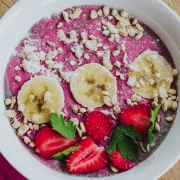The Alpha of Omega 3 Benefits
If you have ever seen an advertisement for a health product or read a blog about losing weight, chances are that you are familiar with the term “Omega 3”. Omega 3 fatty acids play an integral role in the functioning of your heart, lungs, immune system, endocrine system, and blood vessels. It also ensures that you have energy by providing your body with calories.
What is The Best Source of Omega 3?
Your body can synthesize most fats. This is, however, not the case when it comes to omega 3 fatty acids. This means that it is essential acids that you can get through your diet. The best source of Omega 3 fatty acids is widely considered to be fish like mackerel, sardines, and salmon, but there are more sources of this polyunsaturated fatty acids. These include soybeans, walnuts, salmon, canola oil, chia seeds, flaxseeds and flaxseed oil, which are found in Dure’s Lifestyle Meal Supplement Products.
Many of these sources have other health benefits as well. Flaxseeds are considered to be a superfood that fights cancer and that reduces sugar cravings. Chia seeds can reduce the risk of type 2 diabetes and Salmon is an excellent source of protein.
Is Omega 3 Good for Weight Loss?
Even though it is not possible to say explicitly that Omega 3 intake leads to weight loss, it plays a secondary role that helps people lose weight easier. First and foremost, the intake of fish oil or other sources of Omega 3 can reduce appetite and hunger. This is why foods that are rich in Omega 3 are sometimes included in diets.
Omega 3 may also increase a person’s metabolism. This means that it increases your metabolic rate, which is an indicator of the number of calories that you burn throughout the day. People with a higher metabolic rate will find it easier to lose weight and to keep the weight off.

People with a higher intake of Omega 3 may also experience an increase in muscle mass. Since muscle burns more calories than fat does, this may explain the increase in metabolism as well. Omega 3 tends to increase the number of calories you burn when you exercise as well. This is why many people that use a combination of Omega 3 in their diets and exercise may lose weight more rapidly.
The studies that were conducted in the past did not deliver the same results in terms of weight loss. Although Omega 3 is considered to be good for your health, you still have to make sure that you maintain a healthy lifestyle and a balanced diet while not exceeding an intake of 3,000 mg of fish oil Omega 3 per day.
Is Omega 3 Good for Hair Loss?
Since Omega 3 has anti-inflammatory properties, it is good for hair loss by opening up the hair follicles and stimulating hair growth. If you are experiencing hair loss, try increasing your Omega 3 intake. Not only will it stimulate hair growth, but it can also prevent dry and flaky scalp.



